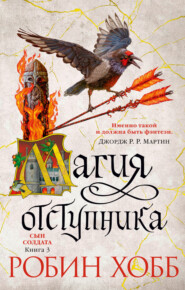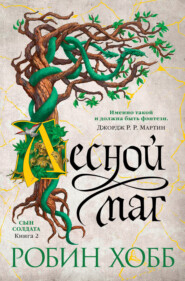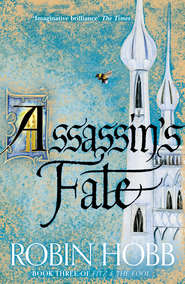По всем вопросам обращайтесь на: info@litportal.ru
(©) 2003-2024.
✖
The Farseer Series Books 2 and 3: Royal Assassin, Assassin’s Quest
Автор
Год написания книги
2018
Настройки чтения
Размер шрифта
Высота строк
Поля
‘No. But then, I am not the Queen-in-Waiting.’
‘Waiting. Ah, I understand well now that part of my title.’ A bitterness I had never heard from her before crept into her voice. ‘But Queen? In my land, as well you know, we do not say Queen. Were I there now, and ruling instead of my father, I would be called Sacrifice. More, I would be Sacrifice. To whatever was to the good of my land and my people.’
‘Were you there now, in the deep of winter, what would you be doing?’ I asked, thinking only to find a more comfortable area of conversation. It was a mistake.
She grew silent and stared out the window. ‘In the mountains,’ she said softly, ‘there was never time to be idle. I was the younger of course, and most of the duties of Sacrifice fell upon my father and my older brother. But, as Jonqui says, there is always enough work to go round and some to spare. Here, in Buckkeep, all is done by servants, out of sight, and one sees only the results, the tidied chamber, the meal on the table. Perhaps it is because this is such a populous place.’
She paused a moment and her eyes went afar. ‘In Jhaampe, in winter, the hall and the town itself grow quiet. Snows fall thick and heavy, and great cold closes in on the land. The lesser used trails disappear for the winter. Wheels are replaced by runners. Visitors to the city have long gone home by now. In the palace at Jhaampe, there is only the family, and those who choose to stay and help them. Not serve them, no, not exactly. You have been to Jhaampe. You know there are none who only serve, save for the royal family. In Jhaampe, I would rise early, to fetch the water for the household porridge, and to take my turn at the stirring of the kettle. Keera and Sennick and Jofron and I would make the kitchen lively with talk. And all the young ones dashing about, bringing in the firewood and setting out the plates and talking of a thousand things.’ Her voice faltered, and I listened to the silence of her loneliness.
After a bit she went on, ‘If there was work to be done, heavy or light, we all joined in it. I have helped to bend and lash the branches for a barn. Even in the deep of winter, I have helped to clear snow and raise new roof arches for a family devastated by a fire. Do you think a Sacrifice cannot hunt down a cranky old bear that has turned to killing goats, or strain against a rope to help brace a bridge battered by flood waters?’ She looked at me with real pain in her eyes.
‘Here, in Buckkeep, we do not risk our queens,’ I told her simply. ‘Another shoulder can brace a rope, we have dozens of hunters who would vie for the honour of dispatching a cattle killer. We have but one queen. There are things a queen can do that no other can.’
Behind us in the room, her ladies had all but forgotten her. One had summoned a page, and he had returned with sweet cakes and steaming tea in a pot. They chatted together, warming their hands about their tea-cups. Briefly I looked at them, to remember well what ladies had chosen to attend their queen. Kettricken, I was coming to see, might not be the easiest of queens to attend upon. Kettricken’s little maid, Rosemary, sat on the floor by the tea-table, dreamy-eyed, a sweet cake clasped in her small hands. I suddenly wished I were eight years old again and could join her there.
‘I know what you speak of,’ Kettricken said bluntly. ‘I am here to bear an heir to Verity. It is a duty I do not avoid, for I do not consider it a duty, but a pleasure. I only wish I were sure my lord shared my sentiments. Always he is away and about the town on business. I know where he is today; down there, watching his ships arise from planks and timbers. Could I not be with him with no danger to myself? Surely, if only I can bear his heir, only he can sire it. Why must I be confined here while he immerses himself in the task of protecting our people? That is a task I should be sharing as Sacrifice for the Six Duchies.’
Accustomed as I had become to Mountain forthrightness in my time there, I was still shocked at how bluntly she spoke. It made me overbold in my reply. I found myself rising to lean past her and pull the shutters tight over the draughty window. I took advantage of the closeness to whisper fiercely, ‘If you think that is the only duty that our queens bear, you are gravely mistaken, my lady. To speak as plainly as you have, you neglect your duties to your ladies, who are here this day only to attend upon you and converse with you. Think. Could they not be doing this same needlework in the cosiness of their own chambers, or in the company of Mistress Hasty? You sigh after what you perceive as a more important task; but before you is a task the King himself cannot do. You are here to do it. Rebuild the court at Buckkeep. Make it a desirable and attractive place to be. Encourage his lords and ladies to vie for his attention; make them eager to support him in his endeavours. It has been long since there was a congenial queen in this castle. Instead of looking down at a ship that other hands are more capable of building, take up the task you are given, and suit yourself to it.’
I finished re-draping the tapestry that covered the shutters and helped to seal out the cold of the sea storms. I then stepped back and met my queen’s eyes. To my chagrin, she was as chastened as if she were a milkmaid. Tears stood in her pale eyes, and her cheeks were as red as if I had slapped her. I glanced at her ladies, who were still taking tea and chatting. Rosemary, unwatched, was taking the opportunity to poke at the tarts carefully to see what was inside them. No one appeared to have noticed anything amiss. But I was learning rapidly how adept court ladies were at such dissimulation, and feared speculation as to what the Bastard might have said to the Queen-in-Waiting to bring tears to her eyes.
I cursed my clumsiness, and reminded myself that however tall Kettricken might be, she was not much older than myself, and in a foreign place alone. I should not have spoken to her, but should instead have presented the problem to Chade, and let him manipulate someone into explaining it to her. Then it dawned on me that he had already selected someone to explain such things to her. I met her eyes again and ventured a nervous smile. Quickly she followed my glance to the ladies, and as swiftly returned decorum to her face. My heart surged with pride in her.
‘What do you suggest?’ she asked quietly.
‘I suggest,’ I said humbly, ‘that I am ashamed at how boldly I have spoken to my queen. I ask her forgiveness. But I suggest, also, that she show these two royal ladies some special mark of royal favour, to reward them for their faithfulness.’
She nodded her comprehension. ‘And that favour might be?’ she asked softly.
‘A private gathering with their queen in her personal chambers, perhaps for a special minstrel or puppeteer. It matters not what entertainment you provide; only that those who have not chosen to attend you as faithfully be excluded.’
‘That sounds like something Regal would do.’
‘Probably. He is very adept at creating lackeys and hangers-on. But he would do it spitefully, to punish those who had not danced attendance upon him.’
‘And I?’
‘And you, my Queen-in-Waiting, you do it as a reward to those who have. With no thought of punishing those who have not, but only of enjoying the company of those who obviously reciprocate that feeling.’
‘I see. And the minstrel?’
‘Mellow. He has a most gallant way of singing to every lady in the room.’
‘Will you see if he is free this evening?’
‘My lady,’ I had to smile. ‘You are the Queen-in-Waiting. You honour him to request his presence. He will never be too busy to attend upon you.’
She sighed again, but it was a smaller sigh. She nodded her dismissal of me, and rose to advance smiling upon her ladies, begging them to excuse her wandering thoughts this morning, and then asking if they might also attend her this evening in her own chambers. I watched them exchange glances and smile, and knew we had done well. I noted their names to myself. Lady Hopeful and Lady Modesty. I bowed my way out of the room, my departure scarcely noticed.
So I came to be advisor to Kettricken. It was a not a role I relished, to be companion and instructor, to be the whisperer that told her what steps she next must dance. In truth, it was an uncomfortable task. I felt I diminished her by my chiding, and that I corrupted her, teaching her the spidery ways of power in the web of the court. She was right. These were Regal’s tricks. If she worked them with higher ideals and kinder ways than Regal did, my intentions were selfish enough for both of us. I wanted her to gather power into her hands, and with it bind the throne firmly to Verity in the minds of one and all.
Early each evening, I was expected to call on Lady Patience. She and Lacey both took these visits quite seriously. Patience considered me completely at her disposal, as if I were her page still, and thought nothing of requiring me to copy some ancient scroll for her onto her precious red paper, or to demand that I show her my improvement in playing the sea pipes. She always took me to task for not showing enough effort in that area, and would spend the better part of an hour confusing me whilst attempting to instruct me in it. I tried to be tractable and polite, but felt entrapped in their conspiracy to keep me from seeing Molly. I knew the wisdom of Patience’s course, but wisdom does not allay loneliness. Despite their efforts to keep me from her, I saw Molly everywhere. Oh, not her person, no, but in the scent of the fat bayberry candle burning so sweetly, in the cloak left draped over a chair, even the honey in the honey cakes tasted of Molly to me. Will you think me a fool that I sat close by the candle and smelled its scent, or took the chair that I might lean against her snow-damped cloak as I sat? Sometimes I felt as Kettricken did, that I was drowning in what was required of me, and that there was nothing left in my life that was for me alone.
I reported weekly to Chade upon Kettricken’s progress in court intrigue. Chade it was who warned me that suddenly the ladies most enamoured of Regal were courting favour with Kettricken as well. And so I must warn her, who to treat courteously, but no more than that, and whom to genuinely smile upon. Sometimes I thought to myself that I would rather be quietly killing for my king than to be so embroiled in all these secretive schemes. But then King Shrewd summoned me.
The message came very early one morning, and I made haste to dress myself to attend my king. This was the first time he had summoned me to his presence since I had returned to Buckkeep. It had made me uneasy to be ignored. Was he displeased with me, over what had happened at Jhaampe? Surely he would have told me so directly. Still. Uncertainty gnawed me. I tried to make great haste to wait upon him, and yet to take special care with my appearance. I ended up doing poorly at both. My hair, shorn for fever when I was in the mountains, had grown back as bushy and unmanageable as Verity’s. Worse, my beard was beginning to bristle as well. Twice Burrich had told me that I had better decide to wear a beard, or to attend more closely to my shaving. As my beard came in as patchy as a pony’s winter coat, I diligently cut my face several times that morning, before deciding that a bit of bristle would be less noticeable than all the blood. I curried my hair back from my face, and wished I could bind it back in a warrior’s tail. I set into my shirt the pin that Shrewd had so long ago given me to mark me as his. Then I hurried to attend my king.
As I strode hastily down the hall to the King’s door, Regal stepped abruptly from his own doorway. I halted not to run into him, and then felt trapped there, staring at him. I had seen him several times since I had returned, but it had always been across a hall, or a passing glimpse of him while I was engaged in some task. Now we stood, scarce an arm’s length apart, and stared at one another. Almost, we could have been mistaken for brothers, I realized with shock. His hair was curlier, his features finer, his bearing more aristocratic. His garments were peacock’s feathers compared to my wren colours, and I lacked silver at my throat and on my hands. Still, the stamp of the Farseers was plain on us both: we shared Shrewd’s jaw and the fold of his eyelids and the curve of his lower lip. Neither of us would ever compare to Verity’s widely-muscled build, but I would come closer than he would. Less than a decade of years separated our ages. Only his skin separated me from his blood. I met his eyes and wished I could spill his guts upon the clean swept floor.
He smiled, a brief showing of white teeth. ‘Bastard,’ he greeted me pleasantly. His smile grew sharper. ‘Or, that is, Master Fits. A fitting name you’ve taken to yourself.’ His careful pronunciation left no room for doubting his insult.
‘Prince Regal,’ I replied, and let my tone make the words mean the same as his. I waited with an icy patience I had not known I owned. He had to strike me first.
For a time we held our positions, eyes locked. Then he glanced down, to flick imaginary dust from his sleeve. He strode past me. I did not step aside for him. He did not jostle me as once he would have. I took a breath and walked on.
I did not know the guardsman at the door, but he waved me into the King’s chamber. I sighed and set myself another task. I would learn names and faces again. Now that the court was swelling with folk come to see the new queen, I found myself being recognized by people I didn’t know. ‘That’d be the Bastard, by the look of him,’ I’d heard a baconmonger say to his apprentice the other day outside the kitchen doors. It made me feel vulnerable. Things were changing too fast for me.
King Shrewd’s chamber shocked me. I had expected to find the windows ajar to the brisk winter air, to find Shrewd up and dressed and alert at table, as keen as a captain receiving reports from his lieutenants. Always he had been so, a sharp old man, strict with himself, an early riser, Shrewd as his name. But he was not in his sitting room at all. I ventured to the entry of his bedchamber, peered within the open door.
Inside, the room was half in shadow still. A servant rattled cups and plates at a small table drawn up by the great curtained bed. He glanced at me, then away, evidently thinking I was a serving-boy. The air was still and musty, as if the room were disused or had not been aired in a long time. I waited a time for the servant to let King Shrewd know I had come. When he continued to ignore me, I advanced warily to the edge of the bed.
‘My king?’ I made bold to address him when he did not speak. ‘I have come as you bid me.’
Shrewd was sitting up in the curtained shadows of his bed, well propped with cushions. He opened his eyes when I spoke. ‘Who … ah. Fitz. Sit, then. Wallace, bring him a chair. A cup and plate, too.’ As the servant moved to his bidding, King Shrewd confided to me, ‘I do miss Cheffers. With me for so many years, and I never had to tell him what I wanted done.’
‘I remember him, my lord. Where is he, then?’
‘A cough took him. He caught it in the autumn, and it never left him. It slowly wore him away, until he couldn’t take a breath without wheezing.’
I recalled the servant. He had not been a young man, but not so old either. I was surprised to hear of his death. I stood silently, wordless, while Wallace brought the chair and a plate and cup for me. He frowned disapprovingly as I seated myself, but I ignored it. He would soon enough learn that King Shrewd designed his own protocol. ‘And you, my king? Are you well? I cannot recall that I ever knew you to keep to your bed in the morning.’
King Shrewd made an impatient noise. ‘It is most annoying. Not a sickness really. Just a giddiness, a sort of dizziness that sweeps down upon me if I move swiftly. Every morning I think it gone, but when I try to rise, the very stones of Buckkeep rock under me. So I keep to my bed, and eat and drink a bit, and then rise slowly. By midday I am myself. I think it has something to do with the winter cold, though the healer says it may be from an old sword cut, taken when I was not much older than you are now. See, I bear the scar still, though I thought the damage long healed.’ King Shrewd leaned forward in his curtained bed, lifting with one shaky hand a sheaf of his greying hair from his left temple. I saw the pucker of the old scar and nodded.
‘But, enough. I did not summon you for consultations about my health. I suspect you guess why you are here?’
‘You would like a complete report of the events at Jhaampe?’ I guessed. I glanced about for the servant, saw Wallace hovering near. Cheffers would have departed to allow Shrewd and me to talk freely. I wondered how plainly I dared speak before his new man.
But Shrewd waved it aside. ‘It is done, boy,’ he said heavily. ‘Verity and I have consulted. Now we let it go. I do not think there is much you could tell me that I do not know, or guess already. Verity and I have spoken at length. I … regret … some things. But. Here we are, and here is always the place we must start from. Eh?’
Words swelled in my throat, nearly choking me. Regal, I wanted to say to him. Your son who tried to kill me, your bastard grandson. Did you speak at length with him, also? And was it before or after you put me into his power? But, as clearly as if Chade or Verity had spoken to me, I knew suddenly I had no right to question my king. Not even to ask if he had given my life over to his youngest son. I clenched my jaws and held my words unuttered.
Shrewd met my eyes. His eyes flickered to Wallace. ‘Wallace. Take yourself to the kitchens for a bit. Or wherever you wish that is not here.’ Wallace looked displeased, but he turned with a sniff and departed. He left the door ajar behind him. At a sign from Shrewd, I arose and shut it. I returned to my seat.
‘FitzChivalry,’ he said gravely. ‘This will not do.’
‘Sir.’ I met his eyes for a moment, then looked down.
He spoke heavily. ‘Sometimes, ambitious young men do foolish things. When they are shown the error of their ways, they apologize.’ I looked up suddenly, wondering if he expected an apology from me. But he went on, ‘I have been tendered such an apology. I have accepted it. Now we go on. In this, trust me,’ he said, and he spoke gently but it was not a request. ‘Least said is soonest mended.’

















